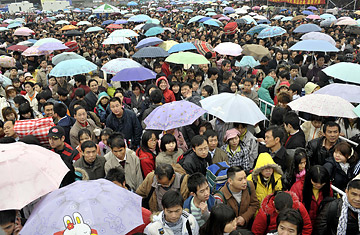
Passengers are stranded at Guangzhou Railway Station in southern China's Guangdong Province.
View Photo Gallery Here
Gao Biao stands in front of the Guangzhou train station with an umbrella in his hand, staring into the crush of people ahead of him. The 27-year-old has spent the past year hard at work in a cosmetics factory in this southern Chinese city, and now he's trying to get back home for the holidays. The trip to his hometown outside the central city of Suzhou takes more than 20 hours — if he can board. Around him, hundreds of people push towards an opening in the barrier surrounding the station. A police officer standing behind a fence shouts into a megaphone, calling for order. "I haven't made any money here," Gao says. "But I want to go home to see my mother."
The Lunar New Year or Spring Festival, which begins Feb. 7, is China's most important holiday. Each year the nation's roads and rail lines are swamped by the world's largest annual human migration. Factories and mines close down for as long as two weeks, providing the year's only chance to return home for many of the 200 million migrant workers who drive the country's booming economy.
This year, travel has been particularly grueling, as some of the heaviest snowstorms in recent memory have wrought destruction and misery in 14 of China's provinces. The Ministry of Civil affairs announced on Monday that 24 people had died in storm-related accidents, including 10 in collapsed houses. On Tuesday, 25 people were killed when a bus slid off an icy road in southwestern Guizhou province, the state-run Xinhua News Service reported. Some 80 million people have been affected by the storm, 1 million of them having had to be relocated. Damage, including the collapse of 100,000 houses, is estimated at $3 billion. Central Hunan province, which saw its heaviest snowfall in half a century, was the worst hit, with $1.5 billion in damage and 29 million affected, the state-run China Daily reported. Shanghai closed four expressways, and the cancellation of 2,000 buses and nearly 100 flights left thousands stranded.
While Guangzhou avoided the worst of the weather, it is the site of some of the most vivid scenes of adversity. The city, capital of the country's most prosperous province, is a major transit hub through which millions of migrants would have to pass on their homeward journey. Road and rail outages have left as many as half a million stranded here. The main rail link between Guangzhou and Beijing was disabled when heavy snow and ice in Hunan province knocked out power lines last weekend, leaving at least 136 trains stranded, according to Xinhua. Several highways north out of Guangzhou were also closed.
While many have heeded the large red banners urging them to avoid traveling and instead cash in their tickets for refunds, several thousand remain around the station as their hopes diminish. They stand underneath umbrellas and in flimsy ponchos, seeking some shelter from the rain and temperatures in the mid-40s. Puddles grow to ankle depth, and staying dry is difficult. Thousands more gather beneath an elevated highway, some huddled under blankets, but most just mill aimlessly about and talk.
In a nearby KFC outlet, one woman asks about the cheapest menu options, then asks for a discount. The counter girl tells her there's no bargaining and shoos her away. Nearby, three friends who work together at a fishing tackle factory sit at a high table and ponder their options. They had showed up early in the morning for a 6.30 p.m. train home to Chongqing, but despite a day of waiting on line, they still couldn't get through the throng into in the station in time. "We're wondering if we should stay or go," says Jiang Jinan, 30. "If we go home, it should be this week," says Liao Guoli, 33. "But if we can't go back we'll just celebrate here."
Outside, Wan Chunbo, a 23-year-old driver for a company in Guangzhou, watches as a neon sign flashes the locations of ticket refund centers. "I want to go home, but I think it will be tough," he says, shivering and nodding at the crowds nearby. "Look at all those people." He doubts his chances of making it home to Jiangxi province, an eight-hour trip. "Spring Festival is almost here so everybody wants to go home and be with their families," Wan says. "My heart will be a little pained if I can't make it. I've worked out here for so long, and this is the only chance I have to see my father and mother."
Back near the station entrance, under giant signs proclaiming "Unify the motherland" and "Vitalize the nation," Gao is no more sanguine about his own chances of making it home. The hands of the giant neon green clock tick closer to his 9:56 p.m. departure time, but he gets no closer to the front of the line. "This is a real headache, but there's nothing I can do," he says. "I don't think I'll be getting on that train."
